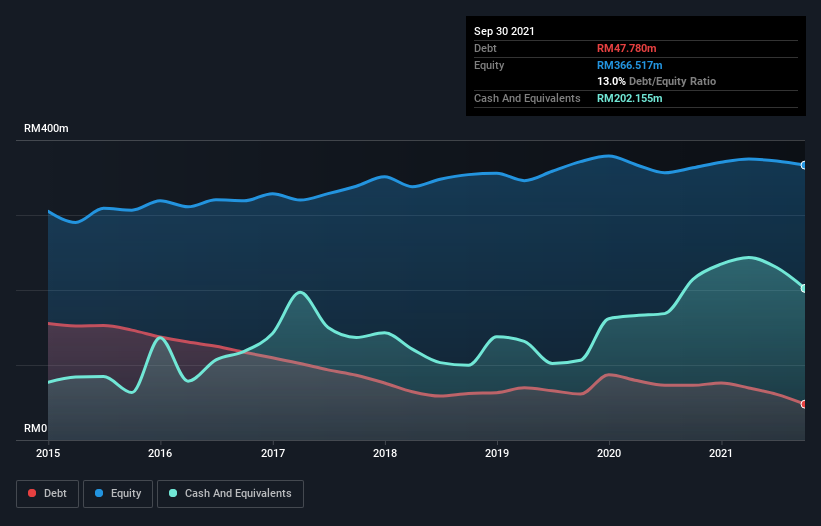
Howard Marks put it nicely when he said that, rather than worrying about share price volatility, 'The possibility of permanent loss is the risk I worry about... and every practical investor I know worries about.' So it might be obvious that you need to consider debt, when you think about how risky any given stock is, because too much debt can sink a company. We can see that Deleum Berhad (KLSE:DELEUM) does use debt in its business. But should shareholders be worried about its use of debt?
When Is Debt Dangerous?
Generally speaking, debt only becomes a real problem when a company can't easily pay it off, either by raising capital or with its own cash flow. Ultimately, if the company can't fulfill its legal obligations to repay debt, shareholders could walk away with nothing. While that is not too common, we often do see indebted companies permanently diluting shareholders because lenders force them to raise capital at a distressed price. Of course, debt can be an important tool in businesses, particularly capital heavy businesses. When we examine debt levels, we first consider both cash and debt levels, together.
View our latest analysis for Deleum Berhad
What Is Deleum Berhad's Net Debt?
You can click the graphic below for the historical numbers, but it shows that Deleum Berhad had RM47.8m of debt in September 2021, down from RM72.9m, one year before. But it also has RM202.2m in cash to offset that, meaning it has RM154.4m net cash.

How Strong Is Deleum Berhad's Balance Sheet?
The latest balance sheet data shows that Deleum Berhad had liabilities of RM194.9m due within a year, and liabilities of RM23.5m falling due after that. Offsetting these obligations, it had cash of RM202.2m as well as receivables valued at RM151.8m due within 12 months. So it can boast RM135.6m more liquid assets than total liabilities.
This surplus strongly suggests that Deleum Berhad has a rock-solid balance sheet (and the debt is of no concern whatsoever). Having regard to this fact, we think its balance sheet is as strong as an ox. Succinctly put, Deleum Berhad boasts net cash, so it's fair to say it does not have a heavy debt load!
It is just as well that Deleum Berhad's load is not too heavy, because its EBIT was down 49% over the last year. When it comes to paying off debt, falling earnings are no more useful than sugary sodas are for your health. There's no doubt that we learn most about debt from the balance sheet. But you can't view debt in total isolation; since Deleum Berhad will need earnings to service that debt. So when considering debt, it's definitely worth looking at the earnings trend. Click here for an interactive snapshot.
Finally, a business needs free cash flow to pay off debt; accounting profits just don't cut it. Deleum Berhad may have net cash on the balance sheet, but it is still interesting to look at how well the business converts its earnings before interest and tax (EBIT) to free cash flow, because that will influence both its need for, and its capacity to manage debt. Happily for any shareholders, Deleum Berhad actually produced more free cash flow than EBIT over the last three years. That sort of strong cash generation warms our hearts like a puppy in a bumblebee suit.
Summing up
While it is always sensible to investigate a company's debt, in this case Deleum Berhad has RM154.4m in net cash and a decent-looking balance sheet. The cherry on top was that in converted 192% of that EBIT to free cash flow, bringing in RM19m. So we don't think Deleum Berhad's use of debt is risky. When analysing debt levels, the balance sheet is the obvious place to start. But ultimately, every company can contain risks that exist outside of the balance sheet. To that end, you should learn about the 3 warning signs we've spotted with Deleum Berhad (including 1 which is a bit unpleasant) .
If, after all that, you're more interested in a fast growing company with a rock-solid balance sheet, then check out our list of net cash growth stocks without delay.
New: Manage All Your Stock Portfolios in One Place
We've created the ultimate portfolio companion for stock investors, and it's free.
• Connect an unlimited number of Portfolios and see your total in one currency
• Be alerted to new Warning Signs or Risks via email or mobile
• Track the Fair Value of your stocks
Have feedback on this article? Concerned about the content? Get in touch with us directly. Alternatively, email editorial-team (at) simplywallst.com.
This article by Simply Wall St is general in nature. We provide commentary based on historical data and analyst forecasts only using an unbiased methodology and our articles are not intended to be financial advice. It does not constitute a recommendation to buy or sell any stock, and does not take account of your objectives, or your financial situation. We aim to bring you long-term focused analysis driven by fundamental data. Note that our analysis may not factor in the latest price-sensitive company announcements or qualitative material. Simply Wall St has no position in any stocks mentioned.
About KLSE:DELEUM
Deleum Berhad
An investment holding company, provides products and services to the oil and gas industries primarily in Malaysia.
Flawless balance sheet with solid track record.
Market Insights
Community Narratives



